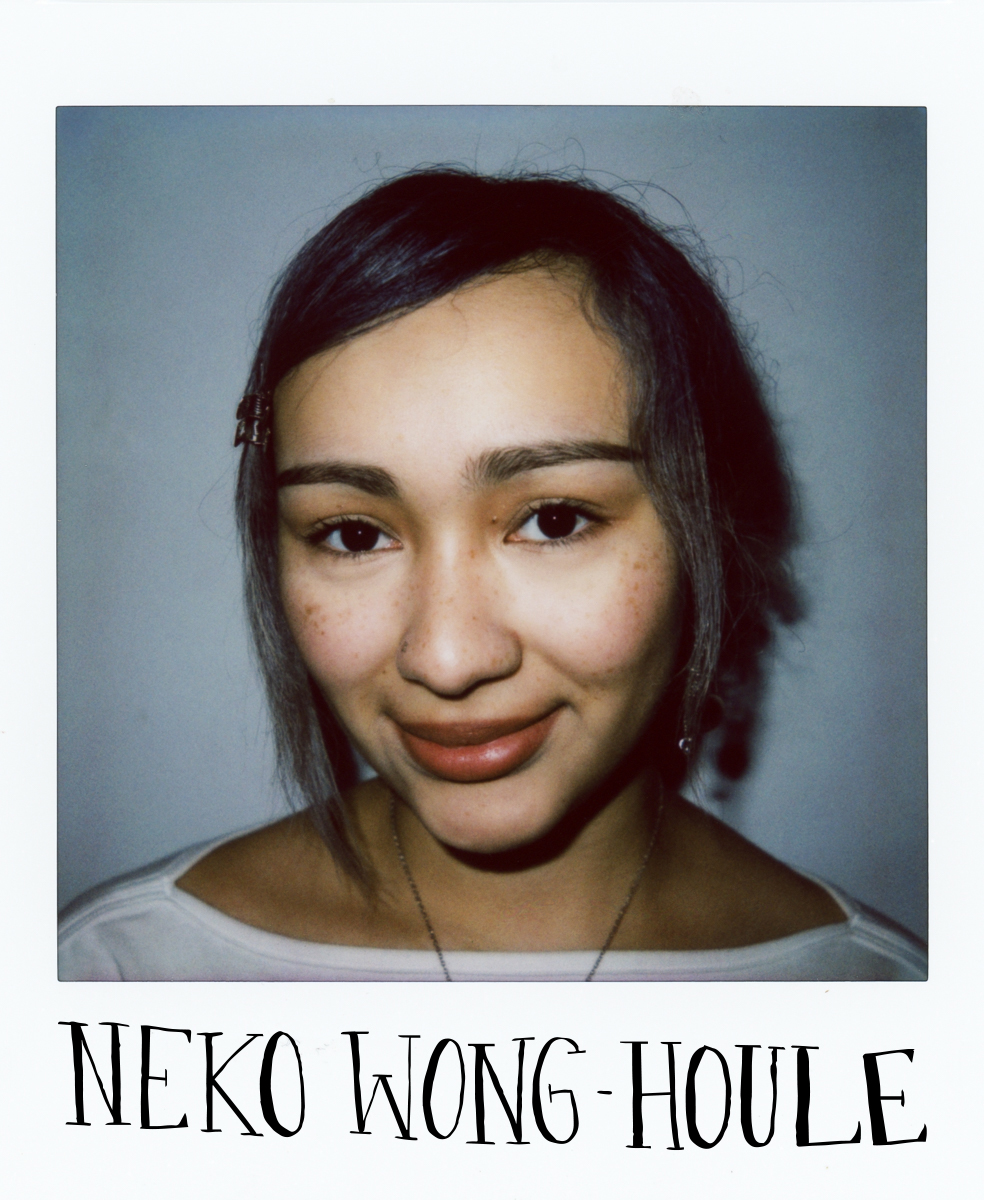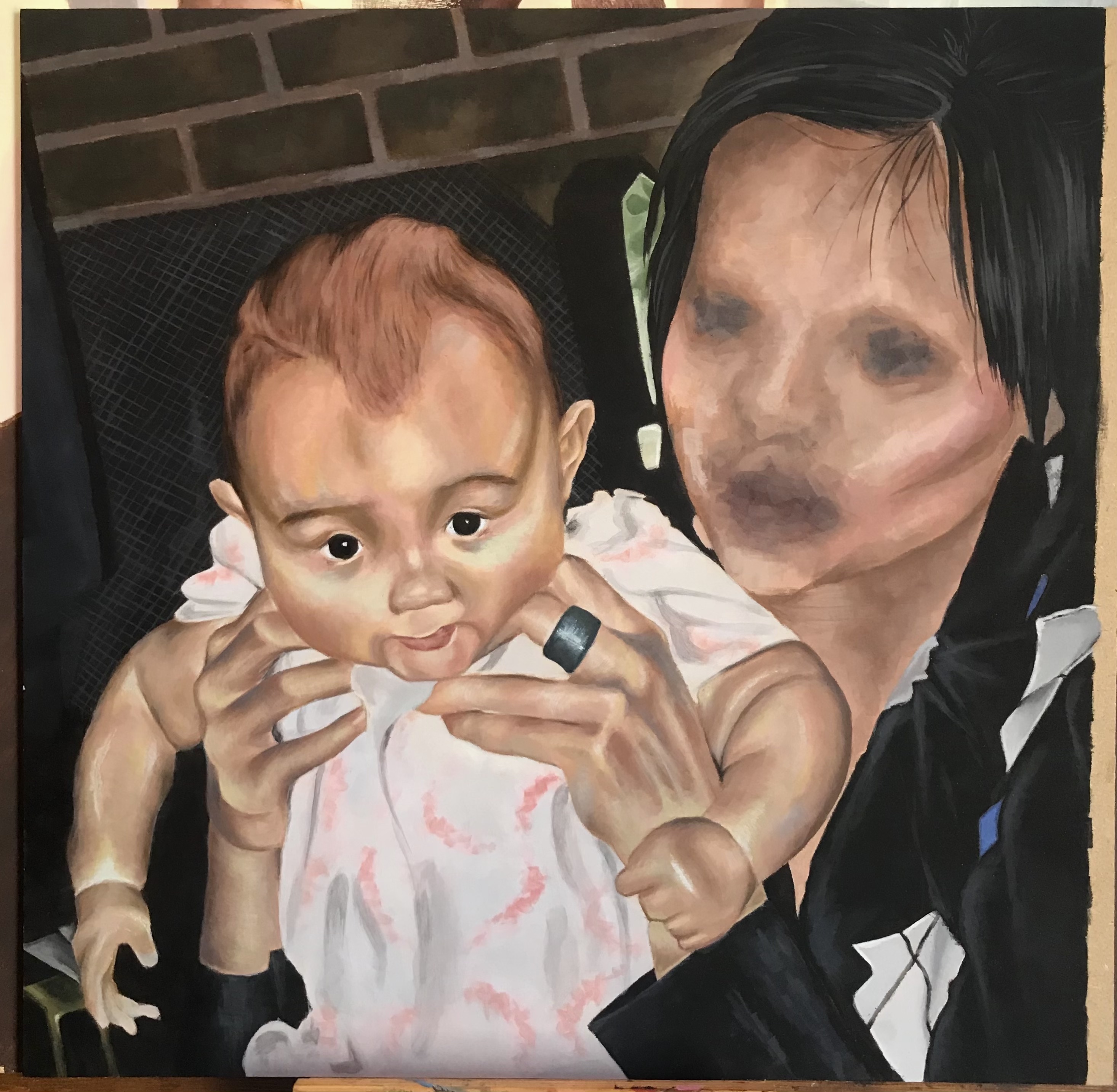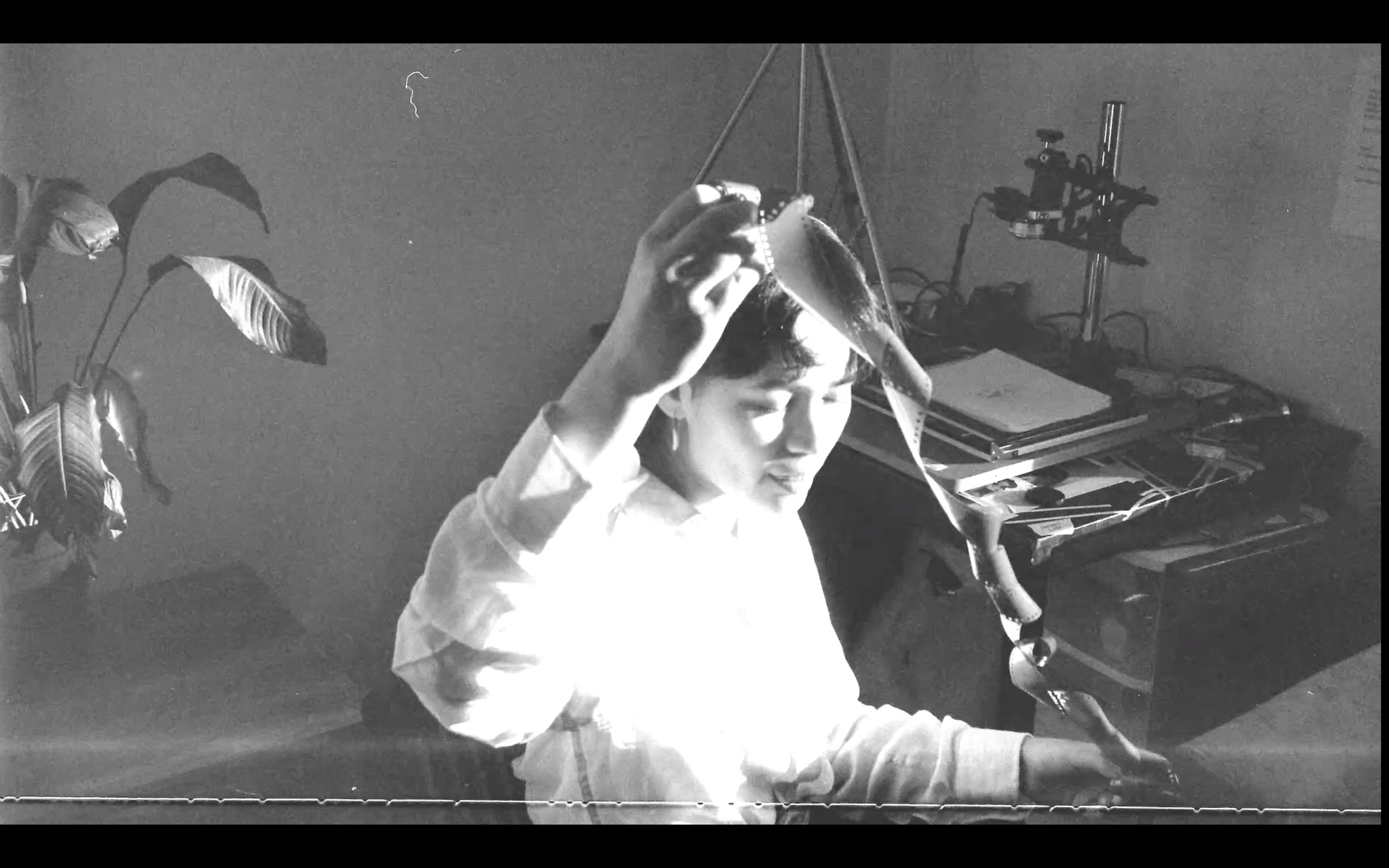Artist: Neko Wong-Houle

Neko Wong-Houle [she/they] is a queer, mixed Indigenous (Kainai, Blackfoot,) and Chinese femme currently working towards a multimedia practice with primary interests in animation and fine arts practices, such as printmaking and painting. Their work involves engaging with the implications of a broken family in a “post-colonial” world and what that means as a representative of preservation. While their primary focus is to reclaim autonomy over their own creative identity, she is currently interested in engaging with moving-image. More specifically the possibilities of recalling the visual and auditory ways in which her people hav communicated and continue to communicate.
While a lot of her practice has spanned in their hometown of Calgary, Alberta, she is currently based in Montréal, Quebec, pursuing film animation at Concordia University.
@neko.wh on Instagram
Below is an interview with our artist of the month.
Abby: Alright, so thank you so much for joining me today Neko.So do you want to give us a little introduction? Name, pronouns, and then any Instagram or website where we can take a look at your work?
Neko: So my name is Neko, I go by she/they
and I just have like a personal Instagram right now. It's neko.wh. And I'm planning on like, doing an art account, or like creative stuff soon. So look out for that. Yeah.
Neko: So my name is Neko, I go by she/they
and I just have like a personal Instagram right now. It's neko.wh. And I'm planning on like, doing an art account, or like creative stuff soon. So look out for that. Yeah.

Rennie Taylor, Neko and Abby, 2023.
A: Amazing. So let's just jump right into it, I guess. So kind of going back to maybe pre University, Montreal, all that. What led you should do the decision that you wanted to pursue a degree in the arts, specifically, animation? And what kind of experience did you have with animation before you came to Concordia?
N: Um, well, animation has always well, art, okay. Art in general has always been like, a huge part of my life. Both my parents graduated from art school. Yeah, my mom was still in, she was actually still working towards the degree when I was born. So she kind of like, took me around campus. So that was a small kid. She went to-- it’s called AU Arts right now. But it used to be called ACAD. It's Alberta, in Calgary Yeah. Yeah, so that's pretty good. And then my dad's like, practicing artist, I've just always been around it. And then animation specifically is just kind of been a passion. I love watching it I love- like my mom, she did some stop motion stuff when I was a kid. And I was just like, This is so sick. I love this little, these little props. It's just like everything and working with movement and stuff is so so cool.
A: Great. And maybe kind of going into more specific parts of your work, like what are some core themes or ideas or, or points of reference that really inspire and drive your practice and, and how did those references like, impact the medium/materials you choose to work with?
N: So I think right now, like in terms of my practice, I'm really trying to develop creative autonomy with my work, and kind of like, discover what I want to do as an artist. Because for a while my practice has revolved around other, like, my parents or working with other artists like studio assisting, stuff like that. So that's like my main goal. But I think a lot of my work is driven by my family, obviously, also, my cultural background, indigenous Blackfoot, kinda from South Alberta, and I'm also half Chinese. So it's like navigating the roles, like a mixed person, and then also queer. So it's just like, yeah, that the intersectionality be real sometimes. Yeah, that impacts on my work.
Neko Wong-Houle, Clip from Áakoyitsi’takiwa [She will grieve], 2D animation, rotoscope, mixed-media painting, 2023.
A: And so how does that like, affect everything? I know you're into animation, and you've done some rotoscoping? With the, your most recent animation? And I guess, maybe, like, have you worked with any other materials? I've seen you've done do some drawings and stuff like that. But is that any? Is that like, does that play a big role in your practice? Or is it mainly centered on animation?
N: Well, animation is kind of a, it's always been an interest, but a lot of like, my work, I’m also super interested in like illustration, as well. It's like painting working with like drawing materials, and I love like, incorporating that into animation now. Whether that's like an aesthetic kind of thing, or like, working with materials directly like the film I did with my dad Otanimm/Onnimm, we used a lot of film photography. We actually like hand developed that ourselves and in our bathroom. So like, I love working kind of DIY like that. And like yeah, kind of unconventional ways. But then recently, like with school and stuff, it's been like, oh, like together which is kind of cool, too. So yeah, just kind of like exploring a lot of different mediums and stuff.
A: Yeah, that's great. And, and kind of maybe getting into the nitty gritty of it, like working with like a really time consuming and like labor heavy medium as animation like, how do you balance like, what's your kind of work schedule likw? How long does it take to finish projects? And how do you balance that with or if you do balance it all with illustration, or painting and drawing or other artistic interests?
N: Well, actually, that's really that's a really good question actually, because I'm still trying to find the answer myself. But I think because I also work part time as well, right? With the indigenous students center at Concordia, so that takes up a lot of my time as well. But in my mind, I think it's also like enhancing my practice, because I'm spending time with my culture, getting involved with a culture. So in terms of that, I think I kind of feed into like, my practice, but like in terms of actually doing the like, the figure drawing the painting, the exercises. It's like, so hard to delegate time to that. And I think that's something I definitely want to work on in the summer, like just planning out animations better. So they can like, execute it better? Yeah, it's always a learning process, I think.

Still from Otanimm/Onnimm [Daughter/Father] co-directed by Neko and Terrance Houle, stop-motion, rotoscope, dialogue, experimental film photography developed using caffenol (coffee and vitamin C), 2020.
A: For sure. So it's something that kind of like changes all the time, like, depending on circumstantial stuff, right? Yeah. I feel like that's how a lot of the artists I've talked to work as well. Like, when I have time!
N: It's like, I'm either gonna work on it for 12 hours, or I'm gonna work on it for a few days. Yeah.
A: Yeah. And, you know, as just wrapping up your first year, I'd love to know more thoughts on Concordia's animation program, because you know, from my roommate, you know, kind of talked about how Concordia is kind of more centered on your own individual animation practice versus like being a pipeline to a studio. So like, what was your experience with that? What are your thoughts on that? And like, has it helped you develop your artistic practice? Or? Yeah.
Neko Wong-Houle, clip from Make It Home Safe montage, home video, “digicam”, 2023.
N: This program is very interesting. I have like, lots of mixed feelings about it. Because I do come from like, a previous year of university. So I'm coming into like this program, I had, I think, higher expectations, but then it's kind of not how I expected it to be but I do really value like, the artistic perspectives that they really advocate for? Working with Under camera? I'm not sure if you know too much about that. Not much. I'm sure other people listening may understand.
Yeah, it's like working with more traditional, like, Fine Arts materials. I think that stuff is so amazing, and like, looking at animation, from different perspectives, but I do think like, I wish we had a bit more time to like, actually enhance my like, animation techniques.
Unfortunately, I didn't get to do that. But I think this program is also about like self inquiry, which I think has its own set of like, really valuable characteristics. So like heading into next year, heading into the summer, and I want to, like, focus more on the self inquiry and, and how I can like utilize the program to enhance what I want to do.
A: I find that's always a big challenge, like balancing your own work in your own practice versus assignment requirements, or what you're supposed to do. So I feel like you always really have to push it and really advocate for yourself. Yeah, and ending it off, kind of going back to the film Otanimm/Onnimm co directed with your dad. I'd love to know more about the process of making that and like, is this your first experience working collaboratively? And were there any challenges along the way, like working with another person, even like, you know, as a family member, your dad? And also I know that that film was shown in a film festival? So like, what was the process of applying to those? Like, did you apply to more than one? And what's the kind of outreach process for once you've finished? How do you get it out there?

Neko Wong-Houle, Broken Evocation, acrylic on canvas, 2021.
N: So I'm gonna just focus on the first part. Um, it was definitely a process making that film because I was in high school. So I think that like, work, practice, like art practice, and then like, social life balance got thrown off like so early. So that was like a big struggle, and then where we can't like, like, right when we finished the film COVID hit. So in terms of festivals and stuff, it made it kind of hard to... it was a different experience because it was mainly online festivals. But yeah, so we actually we were working with, It was like a grant that we got to make the film. So they did like most of the festival, like networking and stuff. But in terms of like, doing, like interviews and stuff with festivals, that was really, I think, a valuable experience. Really interesting. And I'd say like, if you want to get a film out there, just just do it. Like festivals in general, it's kind of a hit or miss, I think. But there will be some hits. There will be some hits. And it will, it will be rewarding.
It's like, 80% miss 20% hit, but you just gotta -- it's about frequency.
A: And but then you gotta be like, yes, the 20%! Exactly.
that's cool about the grant. Was it? Like, do you know what it was through? Like, was it through Canada Council of the Arts?
It's like, 80% miss 20% hit, but you just gotta -- it's about frequency.
A: And but then you gotta be like, yes, the 20%! Exactly.
that's cool about the grant. Was it? Like, do you know what it was through? Like, was it through Canada Council of the Arts?

Still from Otanimm/Onnimm [Daughter/Father] co-directed by Neko and Terrance Houle, stop-motion, rotoscope, dialogue, experimental film photography developed using caffenol (coffee and vitamin C), 2020.
N: It was through the Canada Learning Bond. So it was actually like a producer who reached out to us and then we kind of made the work but we had to kind of distance myself from that producer. And like, just due to some like controversies. Yeah, I don't want to like talk too much about it. It was kind of is there's like that aspect of it. That was also really stressful. Yeah, I think it's, I don't know, I hold the film like dear to my heart, even though like it is dear to my heart, but there's also a lot of baggage with it. I guess. That's, that's kind of why I want to focus on my creative autonomy. But I guess also, like, honor, my past experiences, I think it's something I'm still looking forward to do.
A: So we're kind of gonna move, move away from the collaborative works for now. I guess.
N: Yeah.
A: That's all good. That's all good.
That's fine, Yeah. Yeah. And do you want to maybe give us a little teaser about the film you just completed for your animation? And maybe what kind of themes you're working with? Or, okay. Anything you want to tell us about it?
N: Okay, it's called áakoyitsi’takiwa . And that means she will grieve or it's like, future tense, so she'll grieve in the future. And yeah, it's about grief. And I think it was my attempt at creating something for myself. But again, there's all this like academic pressure and like, the timeline, of course. So yeah, I have like mixed feelings about it. But I think it'd be fun to share with everyone. So it involves a few different techniques. And yes, it's a little bit. Hopefully, it's all touching, hopefully touches the soul. So yeah, let's all I have to say about it.
A: Well, if it touches your soul, I'm sure it'll touch our souls.
Yeah, that's great. And any other Do you have any ideas of stuff you want to do in the future over the summer maybe? Or it's kind of you're leaving it up in the open?
N: I think just like getting back into it, like resting, like getting back into it. Yeah. From like, a non academic standpoint. Because it's kind of traumatizing, like having the academic like, institution always like delegating, or like dictating your work. So I think just like healing from now. Working on stuff, painting drawing, films. All of it. Going on walks, and like taking be real? Yeah.
A: That's great. Well, I'm super excited to see your new film when it drops!
N: Yeah, the debut.
A: And, yeah, I think your work is super interesting. And I'm really happy that you were able to come in and talk to us and be our artists of the month for May. So thank you so much!
A: So we're kind of gonna move, move away from the collaborative works for now. I guess.
N: Yeah.
A: That's all good. That's all good.
That's fine, Yeah. Yeah. And do you want to maybe give us a little teaser about the film you just completed for your animation? And maybe what kind of themes you're working with? Or, okay. Anything you want to tell us about it?
N: Okay, it's called áakoyitsi’takiwa . And that means she will grieve or it's like, future tense, so she'll grieve in the future. And yeah, it's about grief. And I think it was my attempt at creating something for myself. But again, there's all this like academic pressure and like, the timeline, of course. So yeah, I have like mixed feelings about it. But I think it'd be fun to share with everyone. So it involves a few different techniques. And yes, it's a little bit. Hopefully, it's all touching, hopefully touches the soul. So yeah, let's all I have to say about it.
A: Well, if it touches your soul, I'm sure it'll touch our souls.
Yeah, that's great. And any other Do you have any ideas of stuff you want to do in the future over the summer maybe? Or it's kind of you're leaving it up in the open?
N: I think just like getting back into it, like resting, like getting back into it. Yeah. From like, a non academic standpoint. Because it's kind of traumatizing, like having the academic like, institution always like delegating, or like dictating your work. So I think just like healing from now. Working on stuff, painting drawing, films. All of it. Going on walks, and like taking be real? Yeah.
A: That's great. Well, I'm super excited to see your new film when it drops!
N: Yeah, the debut.
A: And, yeah, I think your work is super interesting. And I'm really happy that you were able to come in and talk to us and be our artists of the month for May. So thank you so much!
